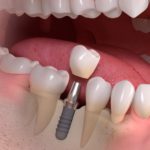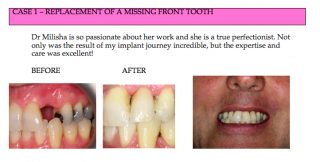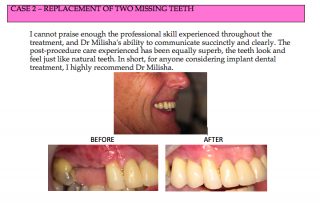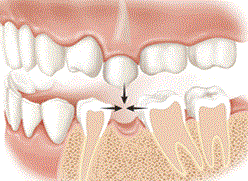Dental Implants Harley Street
Dental Implants are the most advanced therapy available to replace missing teeth. Dental implants have proven to be reliable, and their high success is supported by decades of clinical experience and hundreds of thousands or satisfied patients.
Implant dentistry provides choices for people missing one, a few or all of their teeth. They can also be used to replace failing teeth or teeth affected by gum disease
Why choose 128 Harley Street as your dental implant centre and dental clinic in central London?
- 5 Star rating by happy patients on Facebook and Google
- Consultant and specialist in Orthodontics
- Norwich Medico-chirurgical society award for the best research
- Highest quality Swiss manufactured dental implants used
- Free e-consultation
- One of London’s leading orthodontic and implant centres working as an integrated part of the dental team.
- You are always at the centre of any dental treatment with plenty of time taken at every appointment
- You will always be seen by the same dentist in a caring and relaxed environment
- World-class dentistry in a world-class location
- Amazing results
Meet your dental implant dentist, Dr Milisha Chotai DDS, MSc, MSc (Distinction), PGCert

Dr Milisha Chotai completed her undergraduate dental degree at the world – renowned Karolinska Institute in Stockholm, Sweden in 2008. She has since completed multiple accredited post graduate training courses within the field of dental implantology. She has Masters of Science degree in Dental Implantology at the university of Bristol, for which she was awarded with a pass with distinction.
Dr Milisha is one of the most experienced dentists in the treatment planning, surgical placement and restoration as well as maintenance of dental implants. At 128 Harley Street Dental Suite in central London, she only uses top of the range technology as well as Swiss manufactured materials. These materials have long track records and will ensure long term predictable treatment outcomes for her patients.
What is the dental implant procedure?
 The procedure start with an initial consultation, this is your opportunity to discuss your concerns and have a full assessment for suitability including a treatment plan and pricing options.
The procedure start with an initial consultation, this is your opportunity to discuss your concerns and have a full assessment for suitability including a treatment plan and pricing options.
Once you have agreed your treatment plan and are happy to proceed diagnostic stages begin, these dental implant diagnostic steps ensure we know how you want to look once the procedure is complete, from this we can then plan the dental implant placement and restorative phase with either dental implants crowns, bridges or dentures.
After the diagnostics have been approved by yourself and clinical team we can move onto placement of the implant itself, this is a minor oral surgery procedure although some bone grafting may be required. After healing, anywhere between three and six months we can move on to the restorative phase.
In order to support replacement teeth, dental implants normally have some form of internal titanium screws in the thread or post space that allows a variety of components to be fitted. Once fitted, these components provide the foundation for long-term support of crowns, bridges or dentures.
Does a dental implant look natural?
Dental implants look and perform more like natural teeth. There is no artificial plastic on the roof of the mouth, and the need for adhesives or denture creams is eliminated. More importantly, the use of dental implants has no impact on healthy adjacent teeth.
What are dental implants made from?
Almost all dental implants in use today are made from titanium or titanium alloy, materials that have been shown over many years to be well tolerated by bone, and as the name suggests they can develop and maintain a close union with bone in order to support replacement teeth. Each implant is a small titanium screw and is placed into a socket carefully drilled at the precise location of the intended tooth.
Further questions about your specific situation?
Featured in


Finalist for the Young dentist of the year award 2017.




Free Information Pack
Download a free information pack and find out:
- The costs and lowest price alternatives
- Your options and choices for treatment
- Are you suitable for treatment?
- Can dental implants be used as an alternative to root canal treatment?
- What happens if you smoke?
- How many implants might you need?


Callback Request
Advantages of dental implants
Implant supported teeth are the closest thing possible to natural teeth.
When your dental implant treatment is complete, you should be able to chew, speak and socialize without experiencing the negative emotions that having missing teeth can sometimes cause.
Dental Implants can help minimize the amount of bone that will be lost in the areas of missing teeth. Preserving bone may help in maintaining your remaining natural teeth and natural facial contours.
Replacing your missing teeth with dental implants may reduce your risk of having poorer nutritional habits often found in patients who do not replace missing teeth.
Dental implants can be placed and restored without damaging healthy adjacent teeth. With careful maintenance, this treatment can last a lifetime.
Dr Chotai answers the common questions about dental implants
Oral health is a major factor of good general health. People with missing teeth or non-implant-supported options have problems eating certain foods such as fresh vegetables and fruits, which can compromise their nutrition. Denture-wearing patients also often lose some of their ability to taste foods. In addition, chewing can be difficult and painful so digestion is often compromised. Because dental implants function more like teeth, they offer the benefit of better health due to improved nutrition and taste, as well as proper digestion.
Many patients report that after a while their dentures become progressively looser and do not fit as well as they once did. Initially the increased rate of bone loss following extractions is responsible for the observed deterioration of denture fit. Over the long-term it is the direct effect of chewing forces that causes slow resorption of supporting bone. Therefore the longer dentures are worn, the more the amount of bone available for dental implants may be reduced.
Once in place and supporting teeth, everyday functional forces in the implants stimulate the surrounding bone and gum which responds by becoming stronger and more dense. Like all things there are limits to how much work an implant can do. Your treatment provider will be able to discuss this in more detail as it relates to your case.
Fortunately implants do not suffer from tooth decay. Once the dental implants and surrounding soft tissues are seen to be healthy and the new teeth comfortable and correctly adjusted, it is the quality of your home care and willingness to present for regular maintenance reviews that will have most influence on how long they will last. When poorly cared for, implants will develop a covering of hard and soft deposits (calculus and plaque) which is very similar to that found on neglected natural teeth. Untreated, these deposits can lead to gum infection, bleeding, soreness and general discomfort, just as can occur around natural teeth. Well maintained implants placed into adequate bone can be expected to last for many years and probably for your lifetime. However, just as you would expect conventional crowns, bridges and fillings to need occasional repairs or replacements during their lifetime, your implant-supported teeth may also have similar maintenance requirements over theirs. Dental implants successfully integrate with the bone in more than 95% of cases. In those cases where an implant becomes loose, the implant will be removed and a new one will be placed in a slightly different position to achieve better integration with the bone. Failures may not always be so easy to deal with and if you embark upon this type of treatment you have to be prepared to deal with this possibility. If an implant does not achieve or cannot maintain a rigid fixation with the surrounding bone it will eventually become loose and no longer be able to support replacement teeth. Commonly the failing implant causes no discomfort and if there are enough remaining, it may not be necessary to replace it at all.
Regardless of age, if you have good general health then dental implants will almost certainly work for you. However, habits such as heavy drinking or smoking can increase the number of problems associated with initial healing and thereafter may negatively influence the long-term health of gum and bone surrounding each implant. Remaining teeth might also be compromised making treatment planning less certain. You will be expected to answer detailed questions concerning your medical history and there will be a complete examination of your mouth and remaining teeth to discover the nature and extent of any current dental problems. If you do not have up-to-date x-rays of your remaining teeth you may also be required to have new ones taken. Sometimes models and photos will also be needed so that these can be examined after your visit.
All the common forms of tooth replacement, such as bridges or dentures can be replaced by dental implants. If you are missing just one natural tooth, then one implant is normally all that will be needed to provide a replacement. Larger spaces created by two, three or more missing teeth do not necessarily need one implant per tooth, however the exact number of implants will depend upon the quality and volume of bone at each potential implant site.
Most patients will be very familiar with the dental anesthetics used for routine dentistry and will know how effective they are. Implants are placed using the same anesthesia (unless you have requested general anesthesia). Since the surgery normally involves exposing the bone in the area where the implant and/or bone graft is to be placed you can expect some minor swelling and occasionally bruising afterwards. For most patients, any of the simple painkillers you might take for a headache will be all that is needed for a few days. Healing is generally uneventful and any stitches are removed a week to ten days later. During the first few days you should report any unexpected levels of pain or swelling so that it can be assessed. If in doubt always ask for advice, as early detection of a problem will often lead to a simpler solution. You may also be asked to take a course of antibiotics and to follow some simple procedures such as rinsing with salt water or an antiseptic mouth rinse. It is important that you carry out these instructions.
As individual requirements will be different, the cost will vary depending on complexity and the number of implants required. Surprisingly the total cost of implant treatment is often comparable to the expense of conventional bridge work. Although dental implants may sometimes have a higher initial cost, when all the ongoing expenses of other treatment options are added up, most people would agree that dental implants are more than worth it!
The costs of implants at our Harley Street dental practice in London, West one can be found here.
Dental Implants are designed to be a long lasting solution for tooth loss and are cared for with brushing and flossing. As with natural teeth, you will need to visit your dentist and hygienist periodically for review and maintenance. For the first few months the implants are in function your dentist may ask that you are seen more frequently, however once they are satisfied your treatment is performing as planned, ongoing care will be similar to any patient with natural teeth.
Upper jaw – In the upper jaw, provided the implants stay within the bone that once supported your own teeth there are really no important risk areas. If you have missing upper back teeth then the shape and location of the maxillary sinus (the region above the roots) can be shown to you. The maxillary sinuses can be seen on most x-rays and are therefore readily avoided.
Lower jaw – In the lower jaw the most important anatomical structure to be avoided is the ‘inferior dental nerve’. This nerve runs from the area behind the wisdom teeth, passes under the molars and emerges onto the skin of the face in the region where your premolar teeth are or used to be. This is why a normal dental anesthetic produces a numb lipeven when the needle was placed right at the back of the mouth. If this nerve is disturbed or damaged during the placement of dental implants it can lead to temporary or even permanent numbness of the lip on the affected side. This is a rare but important complication that can be avoided with thorough treatment planning.
CBCT scans can be used as a means for identifying the location of this nerve and allow implants to be placed with considerable confidence. Whilst they are more expensive than routine dental x-rays, the information they provide is often invaluable for complex treatment planning and knowing where important anatomical structures are located.
While the implant is attaching to the bone the missing teeth may be replaced by glue in bridge or removable denture on a temporary basis. The best method will depend on the individual situation.
For routine cases, from the time of implant placement to the time of placing the first teeth, treatment times can vary between 6 weeks and 6 months. The availability of better bone can be used to decrease treatment time, whilst more time and care must be taken with poorer bone, which can therefore extend treatment times beyond six months. If there is no reason to shorten the duration of your treatment then be prepared to wait – nobody loses an implant from being patient and allowing nature to take its course.






